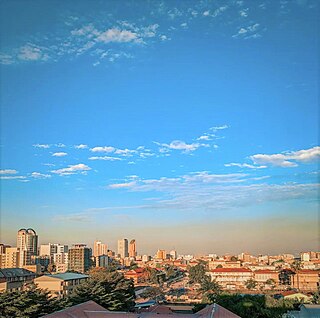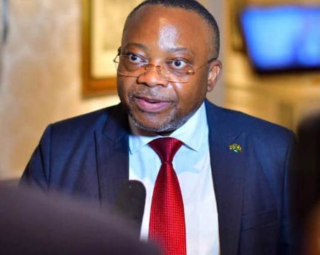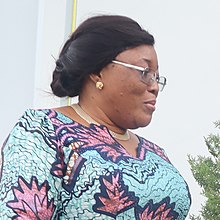
Gombe,also known as La Gombe,or Downtown Kinshasa,is one of the 24 communes of Kinshasa,in the western part of the Democratic Republic of the Congo (DRC). Encompassing a vast area of approximately 29.33 square kilometers,it is home to an approximate population of 49,024 residents (2014).

Tanganyika is one of the 21 provinces of the Democratic Republic of the Congo created in the 2015 repartitioning. Tanganyika,Haut-Katanga,Haut-Lomami and Lualaba provinces are the result of the splitting up of the former Katanga province. Tanganyika was formed from the Tanganyika district whose town of Kalemie was elevated to capital city of the new province.

Moïse Katumbi Chapwe is a Congolese businessman and politician. He leads the Together for the Republic party. He was Governor of Katanga Province,located in the southern part of the Democratic Republic of the Congo,from 2007 to September 2015. He was a member of the People's Party for Reconstruction and Democracy (PPRD) until September 2015. He has been described by The Economist as "probably the second most powerful man in the Democratic Republic of Congo after the president,Joseph Kabila". Jeune Afrique named him "African of the Year" in 2015.
ZoéKabila Mwanza Mbala is a Congolese politician and Member of the National Assembly of the Democratic Republic of the Congo.

Gubernatorial elections took place in 20 out of the 21 new provinces of the Democratic Republic of the Congo on 26 March 2016. The elections were the first to take place since the 2015 repartitioning which saw the 6 largest provinces of 11 split into 21 new ones to form in total the 26 provinces mandated by the DRC constitution. In most of the provinces,the elected governors are members or affiliates of the Alliance of the Presidential Majority.

Gubernatorial elections took place in 11 out of the 26 provinces of the Democratic Republic of the Congo on 26 August 2017,with a second round held in three provinces on August 29. Elections in three other provinces were not held until 21 December 2017. The elections occurred after several governors had been dismissed. Applications of potential candidates were submitted to the Independent National Electoral Commission from 21 to 25 July 2017,with a period for the review of the applications from 26 to 30 July. On August 2,the list of candidates was published and the following two days were granted for any appeals. More than half of the provinces were won by candidates of the Alliance of the Presidential Majority,though some went to independent opposition candidates.

Félix Antoine Tshisekedi Tshilombo is a Congolese politician who has been the President of the Democratic Republic of the Congo since 24 January 2019. He is the leader of the Union for Democracy and Social Progress (UDPS),the DRC's oldest and largest party,succeeding his late father Étienne Tshisekedi in that role,a three-time Prime Minister of Zaire and opposition leader during the reign of Mobutu Sese Seko. Tshisekedi was the UDPS party's candidate for president in the December 2018 general election,which he was awarded,despite accusations of irregularities from several election monitoring organisations and other opposition parties. The Constitutional Court of the DRC upheld his victory after another opposition politician,Martin Fayulu,challenged the result,but Tshisekedi has been accused of making a deal with his predecessor,Joseph Kabila. The election marked the first peaceful transition of power since the state became independent from Belgium in 1960.

Jean-Michel Sama Lukonde Kyenge is a Congolese politician from the former Katanga Province who served as Prime Minister of the Democratic Republic of the Congo from 2021 to 2024. He announced his first cabinet on 12 April 2021. He is a member of the Future of Congo party.

Denise Nyakéru Tshisekedi is the First Lady of the Democratic Republic of the Congo as the wife of President Félix Tshisekedi.

Bintou Keita is a United Nations diplomat from Guinea. She is an expert in conflict resolution. Since January 2021,she has been the Special Representative of the Secretary-General in the Democratic Republic of the Congo.

Faustin Luanga is a Congolese politician and career diplomat who has been Ambassador-at-large for the Democratic Republic of the Congo since 4 June 2021.
Alphonsine Kalume Asengo Cheusi is a Congolese magistrate who in October 2020 became the first woman to be selected as a member of the Constitutional Court of the Democratic Republic of the Congo. Until her appointment,all nine judges had always been male. Earlier in her career,in 2013 she became an advisor to the Supreme Court of Justice and in 2018,an advisor to the Council of State.

General elections were held in the Democratic Republic of the Congo on 20 December 2023. Combined elections were held for the President,484 of the 500 members of the National Assembly,700 of the 716 elected members of the 26 provincial assemblies,and for the first time under the new constitution,951 members of a scaled down number of commune (municipal) councils. On election day,the Congolese government extended voting to 21 December for polling stations that had not opened on 20 December. Agence France-Presse reported that some polling stations would open as late as 24 December.
The Kishishe massacre occurred from November 29 to December 1,2022,in the North Kivu village of Kishishe in the Rutshuru Territory in the eastern Democratic Republic of the Congo. The March 23 Movement,a predominantly Tutsi armed group,summarily killed at least 131 civilians in Kishishe following clashes with local militias,according to a preliminary United Nations investigation. At the same time,the Kinshasa authorities had previously reported approximately 300 fatalities. The attack also resulted in the displacement of hundreds of thousands of people who were forced to flee to other locations such as Kanyabayonga,Kibirizi,Kashala,Kirima,Nyanzale,Kashalira,Bambu,and Kitchanga. Some victims also sought refuge in neighboring countries due to the ongoing violence and instability in the region.

Lulenge constitutes one of the four sectors within the Fizi Territory of South Kivu Province,situated in the eastern region of the Democratic Republic of the Congo (DRC). Geographically positioned adjacent to the Kiloba and Makena villages at an elevation of 943 meters,the sector's administrative center is Kilembwe. Lulenge is delineated to the north by the Itombwe sector and Mwenga Territory,to the east by Lake Tanganyika and the Mutambala sector,to the south by the N'gangya sector,and to the west by Shabunda Territory.
Bibogobogo,alternatively referred to as Bibokoboko in Kibembe,is a village in the middle plateaus of the Mutambala Sector in the Fizi Territory in the South Kivu Province of the Democratic Republic of the Congo (DRC). It is situated in the forested mountains and middle plateaus,overlooking Baraka in the south-west,near Kisombe and Bibokoboko II villages. Geographically,Bibogobogo shares its boundaries with Uvira Territory to the north,Mwenga and Shabunda Territories to the west,Kalemie Territory to the south,and Lake Tanganyika to the east.
The Sacred Union of the Nation is the ruling parliamentary coalition within the parliament of the Democratic Republic of the Congo. It comprises several parties including the Union for Democracy and Social Progress,the Union for the Congolese Nation,the Movement for the Liberation of the Congo,the Unified Lumumbist Party,and the Alliance of the Democratic Forces of Congo and Allies. It was formed in December 2020 by Felix Tshisekedi following a falling out between the Heading for Change coalition and Joseph Kabila's Common Front for Congo. In April 2021 the coalition was able to take control of the government after a four-month-long power struggle. As of June 2023,the coalition is made up of 391 members coming from 24 different political parties.

Between January 24 and 26,2023,M23 rebels and Armed Forces of the Democratic Republic of the Congo (FARDC) soldiers fought over the city of Kitshanga. The battle was part of the renewed M23 offensive,and ended on January 26 with M23 forces capturing the city. Civilians accused both M23 and FARDC-aligned militias of war crimes during and after the battle.
Guy Kabombo Muadiamvitaet Mireille Malengele Kuzoma is a politician in the Democratic Republic of the Congo (DRC). He has served as the Deputy Prime Minister of Defense since 12 June 2024. He served as the director general of the Official Journal of the Democratic Republic of the Congo.













